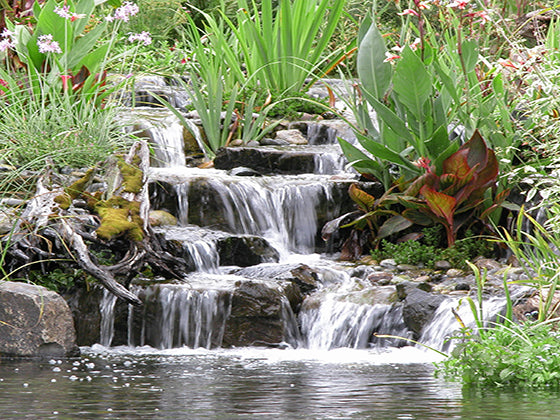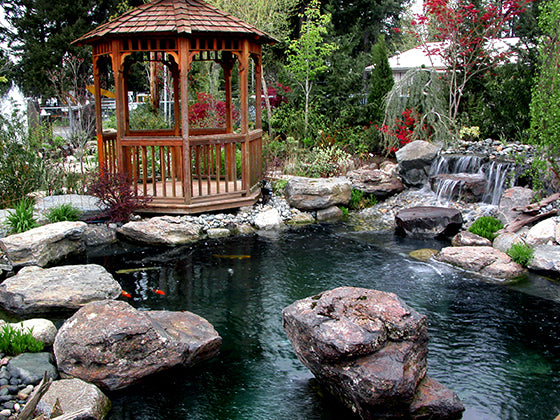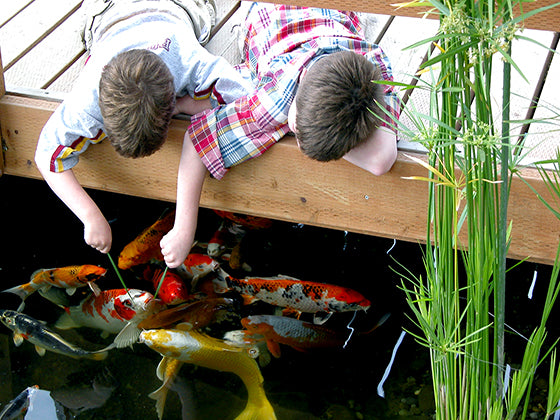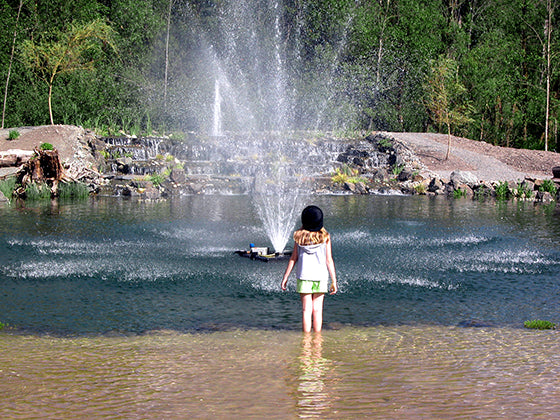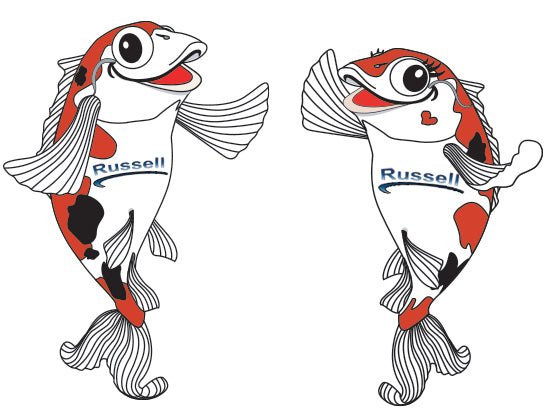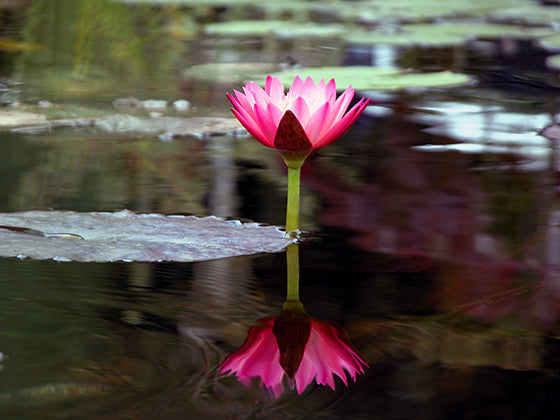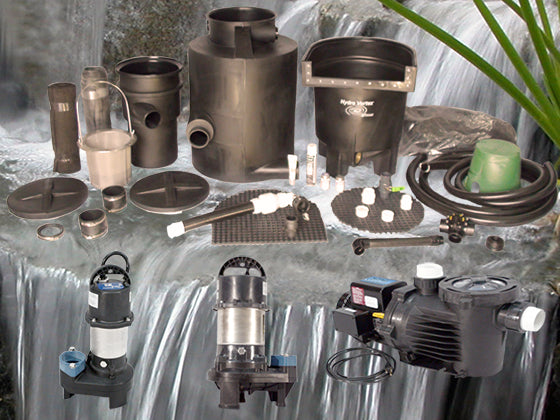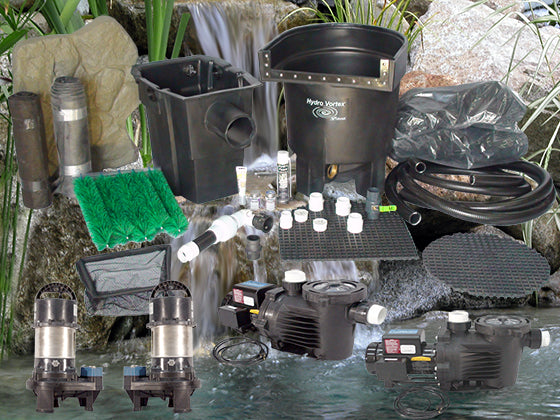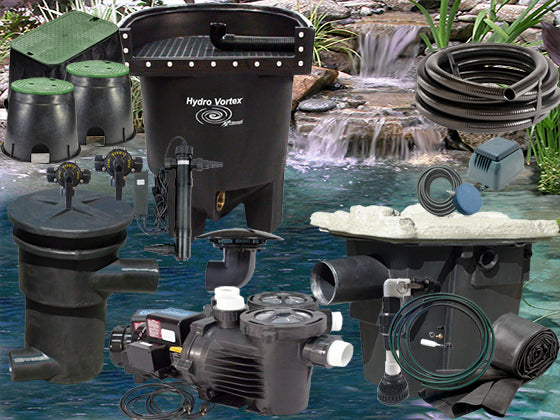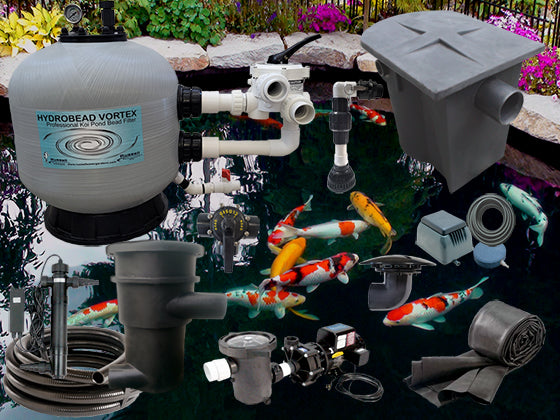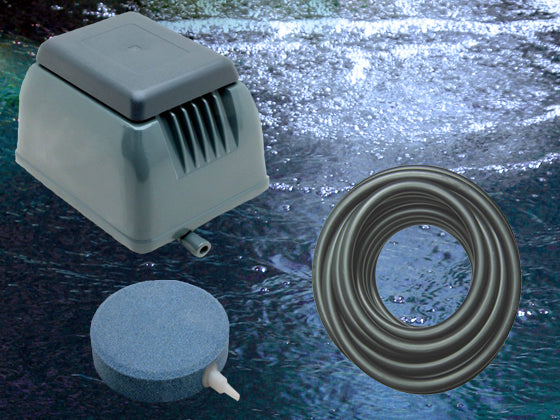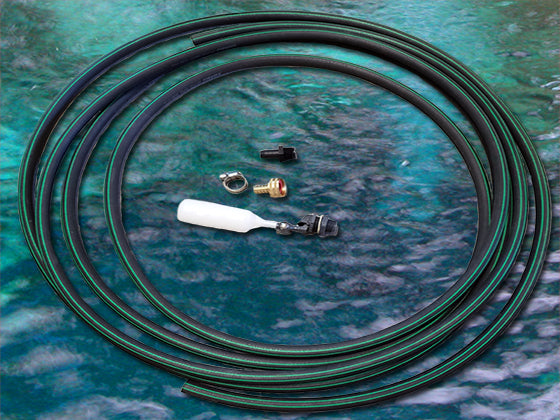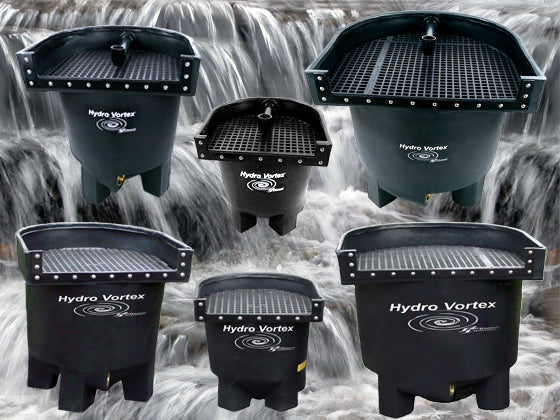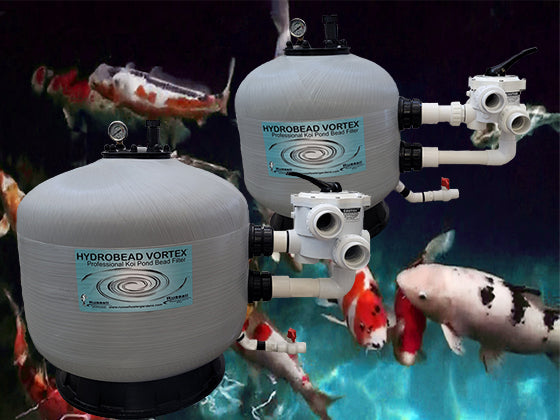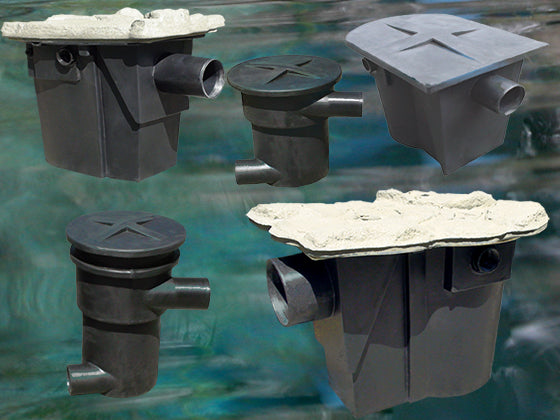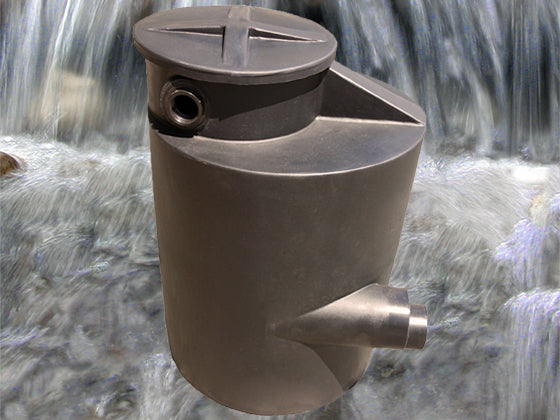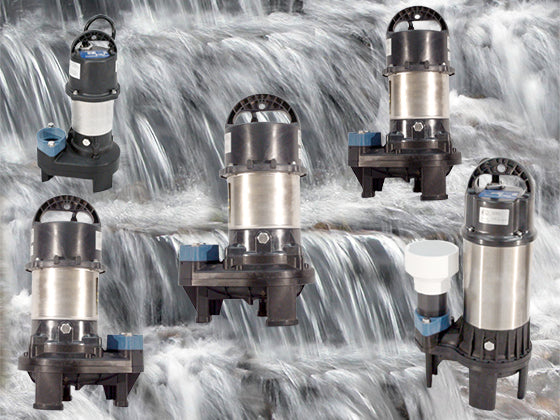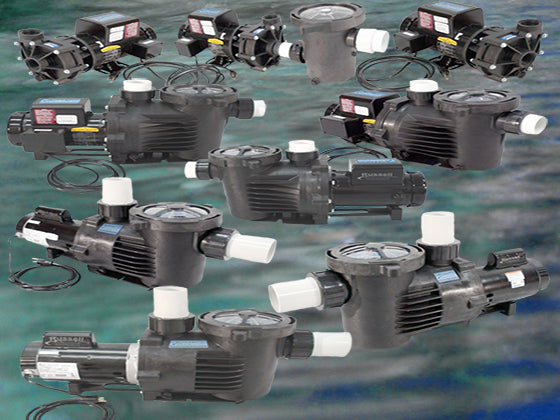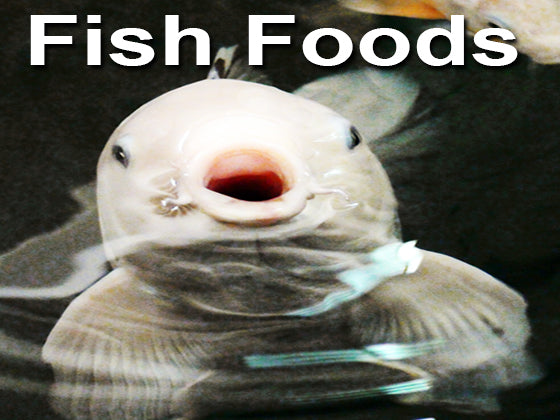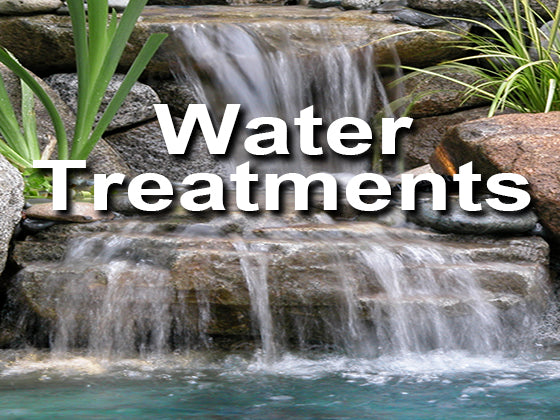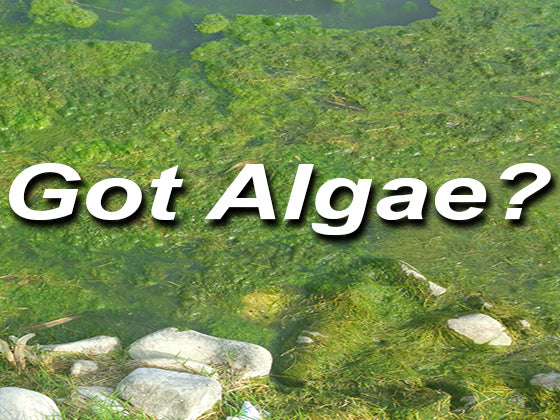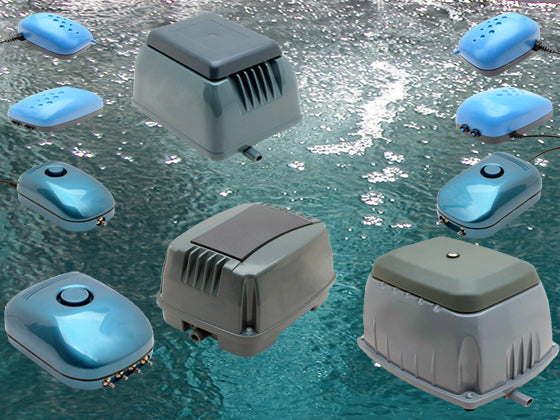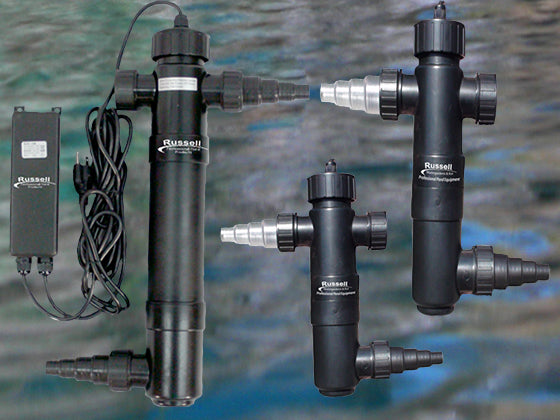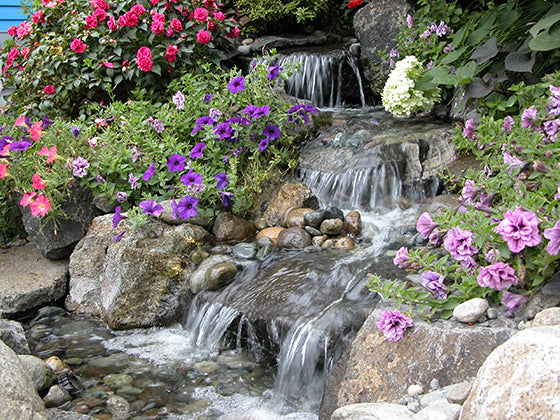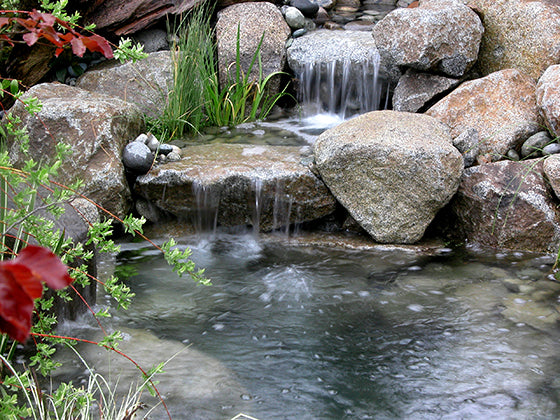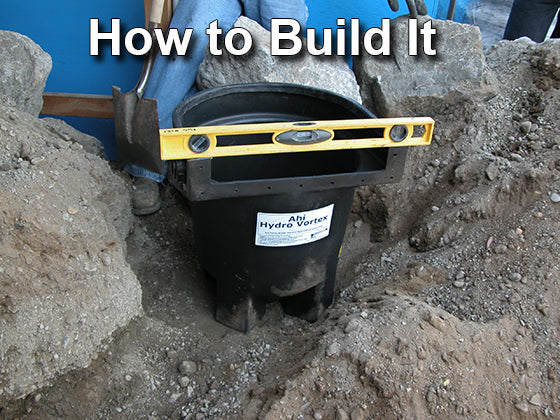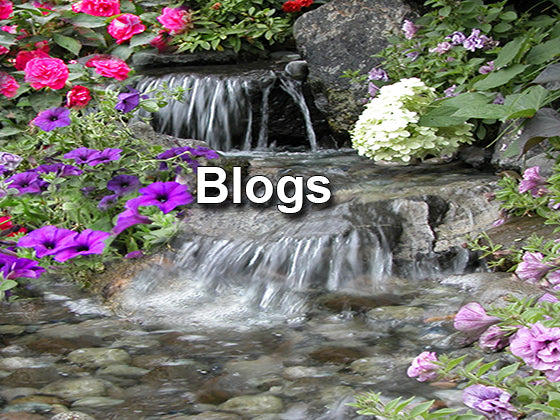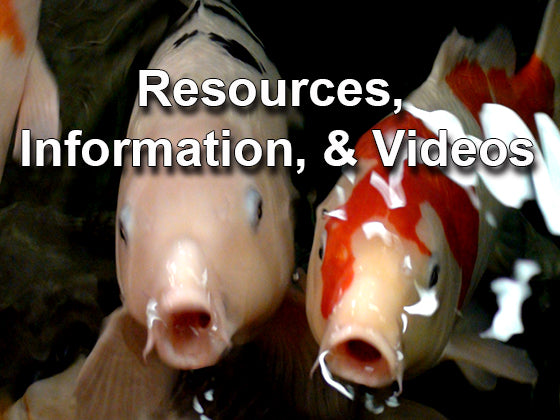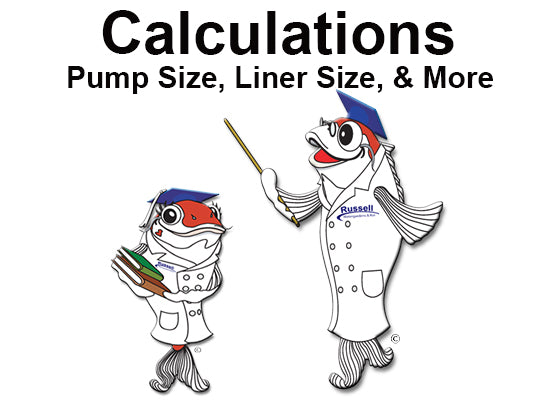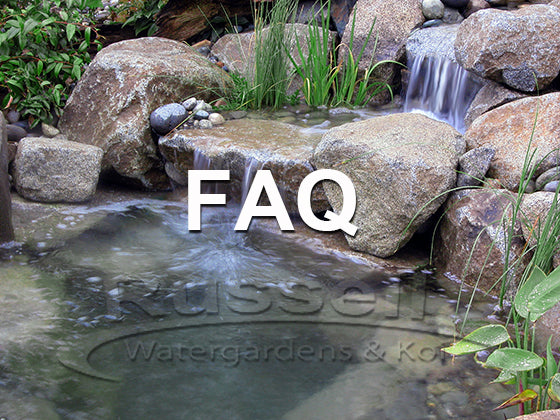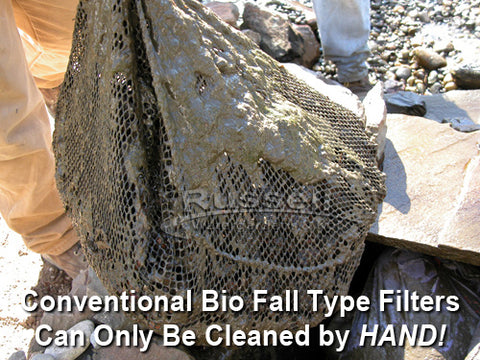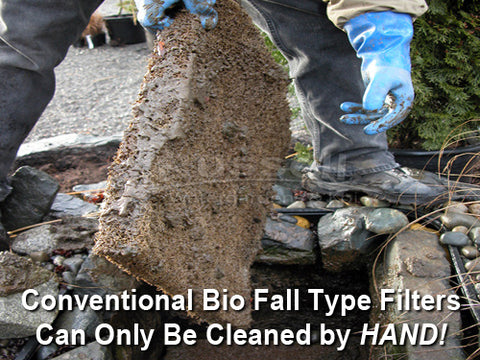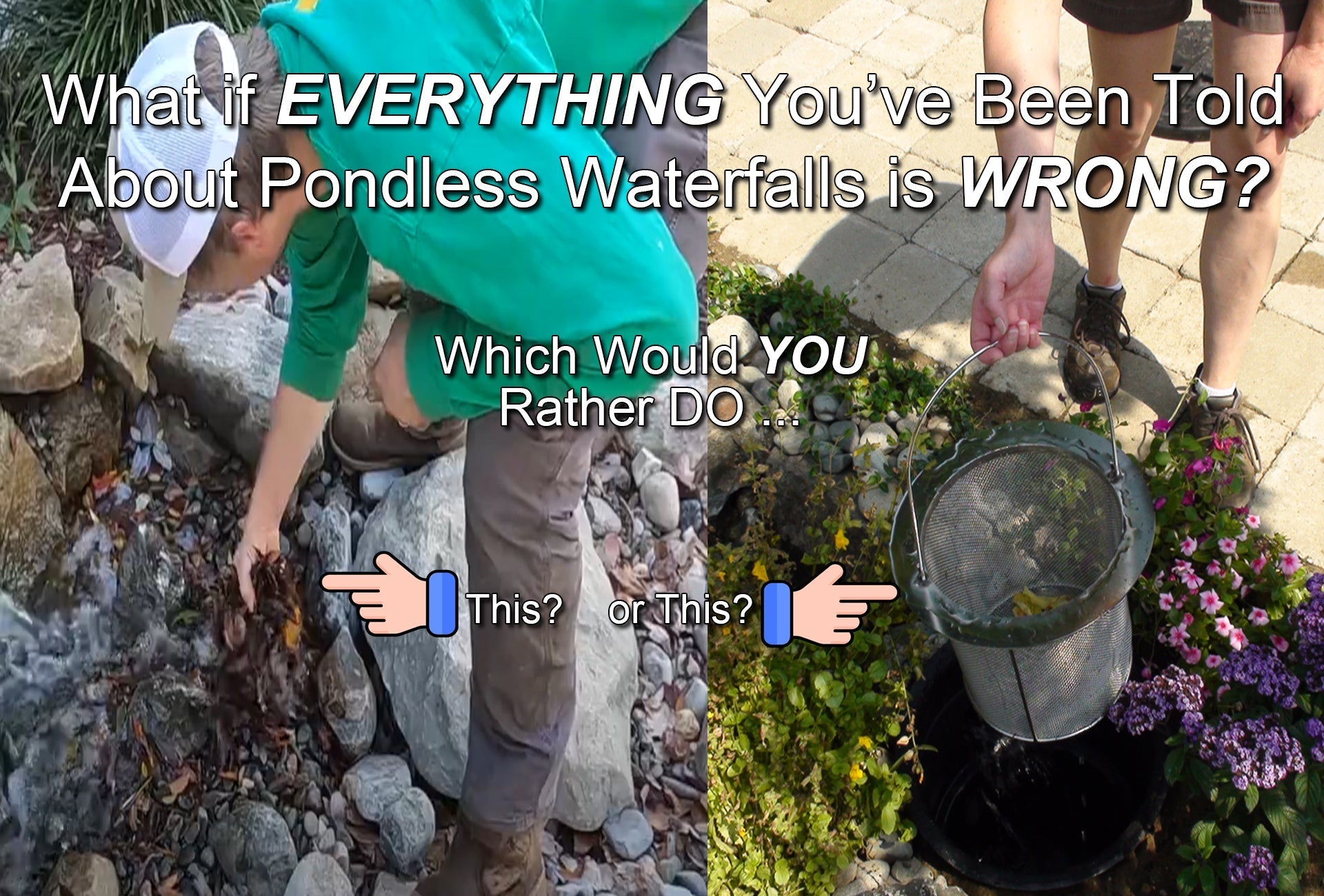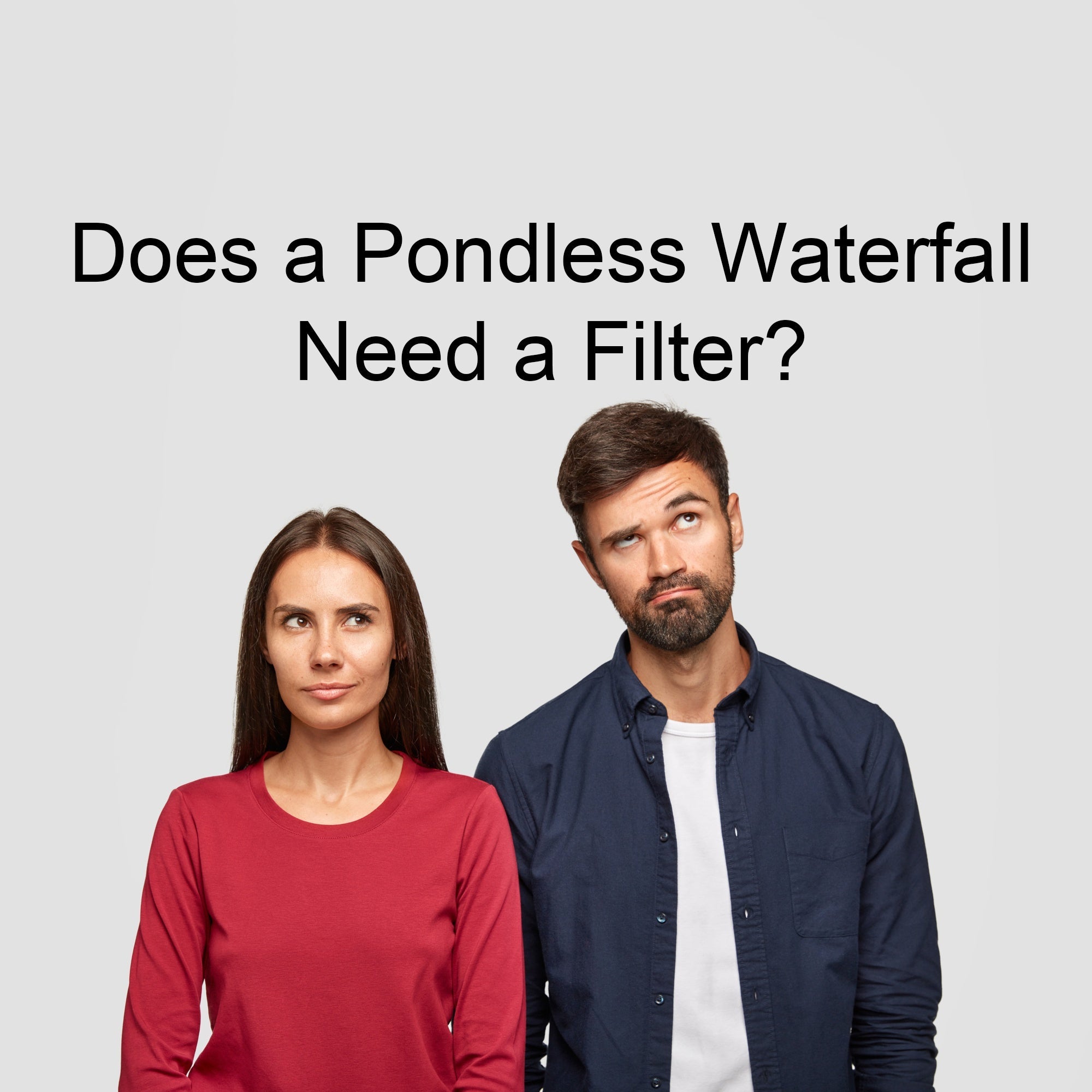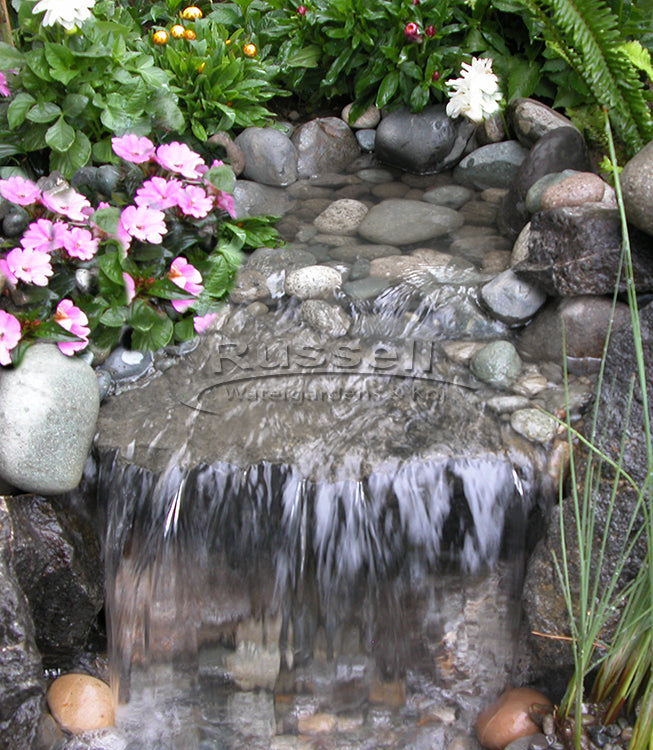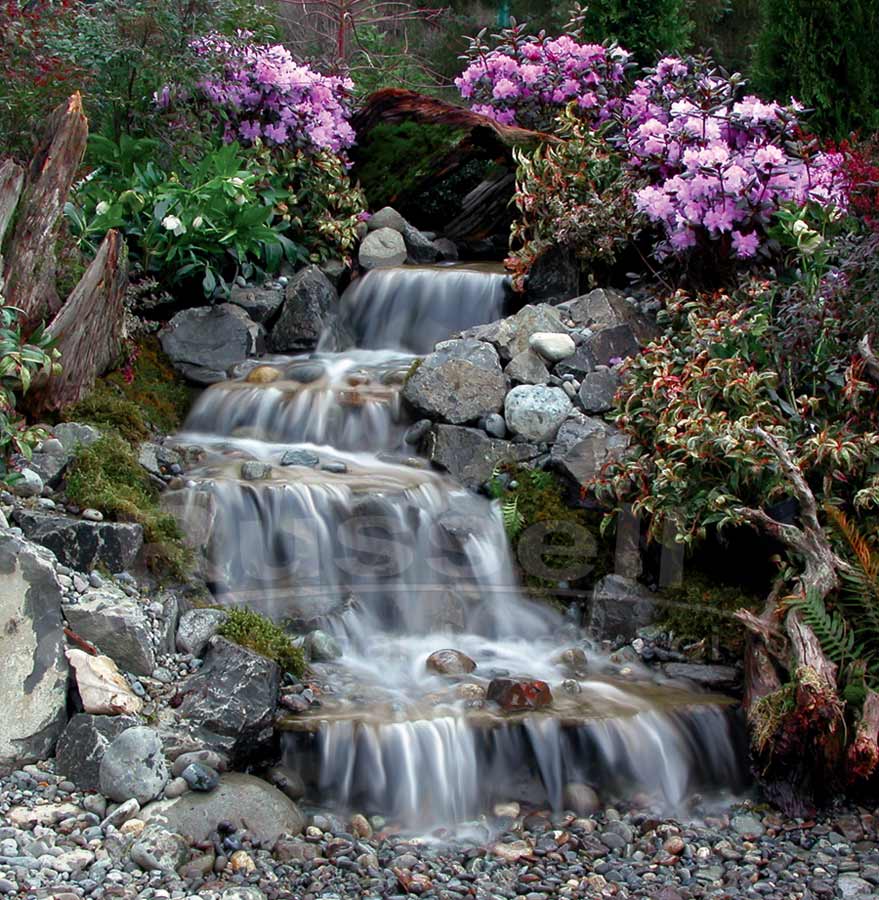
Typical Waterfall Filter Boxes
with Filter Pads and Media Nets
Must be Dismantled BY HAND
for Annual Cleaning!
Think about filters for a moment:
Any type of filter, whether it be for liquids or gasses performs at its peak efficiency when kept clean – waterfall filters are no different. What would happen to your clothes if you didn’t routinely clean the dryer’s lint trap? What would happen to your engine if you didn’t change the oil filter? What would the swimming pool look (or smell) like if you cleaned the pool filter once per year? How would your water or coffee taste if you used the same filter for an entire year?
Everyone knows that filters either need to be kept clean or replaced to work effectively – pure and simple. You should RUN – not walk – away from any conventional bio fall type waterfall filter that boasts that it only requires "annual cleaning". Let us explain.
So what collects in a waterfall filter anyway?
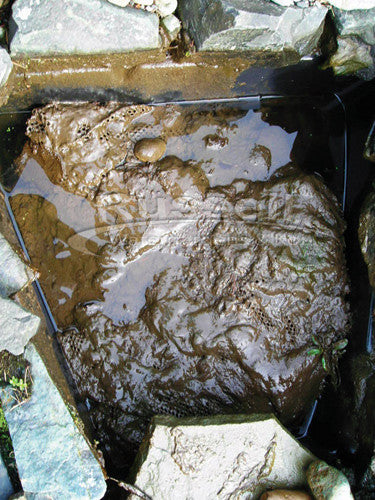
The answer is fish waste, mulm and detritus (waste produced by bacterial colonies), small organic particles, algae, dissolved organic matter, and whatever passes through the pond skimmer or other pre-filter. All this “stuff” is commonly referred to as “sludge”.
Take a good look at this photo of the inside of a conventional bio fall type waterfall filter. This happens to be an Aquascape Biofalls filter, but every brand that uses filter pads and media nets look exactly like this on the inside. This is what an "annually cleaned" filter looks like when it's time to clean it - no matter the brand. This is sludge. The filter pads and media nets filled with lava rock are completely saturated with sludge.
When sludge is allowed to build up inside a conventional bio fall type waterfall filter for an entire year, the filter media becomes clogged and water will channel around the media in the corners as you can see in the photo. Water channeling around the filter media is no longer being filtered. If a filter no longer filters …. then what good is it?

Once the pond filter media is saturated as seen in this photo, the sludge breaks off and finds its way to the bottom of your pond or pondless waterfall where it adversely affects water quality and dramatically promotes algae growth. Additionally, areas within a sludge filled waterfall filter that no longer have water passing through them become stagnant and oxygen-deprived.
What Happens to the Fish With Any Brand of "Annually Cleaned" Waterfall Filter?
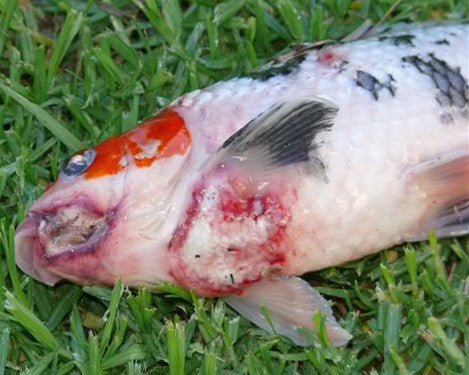
Pathogenic species of bacteria such as Aeromonas and Pseudomonas proliferate in dirty oxygen-deprived pond filter media that eventually pass into the pond. These pathogenic bacteria then attack your fish causing ulcers, open sores, mouth rot, fin rot, disease, and eventual death. This is precisely why most koi clubs are against non-backwashable waterfall filters.
This is why backwashing your pond filter
is so important!!!!
Don’t be misled by claims that the typical biological bio fall type waterfall filter only requires annual cleaning. The health of your fish may be at stake, as well as the appearance of your pond.
Should You Mow Your Lawn Once Per Year Like an Annually Cleaned Waterfall Filter?
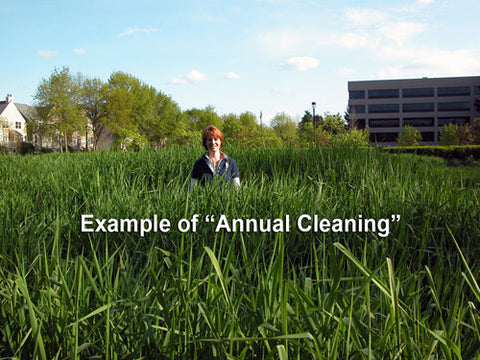
Think about “annually cleaning” a waterfall filter for a moment. Can it be done? Yes. Should it be done? Heck NO!!! You could mow your lawn once per year. Would you do it? Heck NO!!! Your neighbors wouldn’t appreciate your unsightly lawn for 51 weeks per year. It will be a huge time consuming and difficult chore when you do decide to mow it!
What would happen if you “annually” flushed your toilet? The conventional bio fall type waterfall filter that boasts “annual cleaning” is not providing you with the most accurate information about what the job entails.
A saturated waterfall filter encourages excessive algae growth as well as Aeromonas and Pseudomonas pathogenic bacteria proliferation. The algae is extremely ugly, and the pathogenic bacteria are a real danger to your koi and pond fish.
The Problems with Conventional Waterfall Filters

With over 25 years’ experience installing, servicing and seeing the problems with virtually every brand of waterfall filter, company CEO, John Russell invented and patented the Hydro Vortex™ professional backwashable waterfall filter.
His goal: to resolve these common problems with unique design features, efficient function, and ease of cleaning in mind. John studied every waterfall filter available and compared them to koi pond filters - where koi and fish health is the primary concern. He discovered that all koi pond filters have the ability to be periodically backwashed to remove the unwanted fish waste, detritus, and mulm. There wasn’t a waterfall filter, or pondless waterfall filter that had this ability, and as a result, many pond and pondless waterfall owners were experiencing problems with fish health and excessive algae growth.
The Discovery:
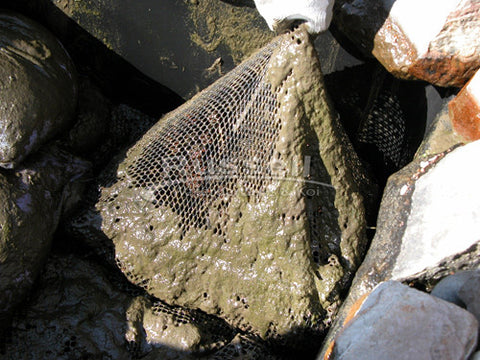
Conventional Bio Fall Type Waterfall Filters
Utilize Media Nets Filled With Lava Rock
As Half Of Its Bio Media
Media nets filled with lava rock or other bio media can only be cleaned by removing them from the filter by hand and rinsing them with high pressure water.

Conventional Bio Fall Type Waterfall Filters
Utilize Filter Pads As Half Of Its Bio Media
Filter pads can only be cleaned by removing them from the filter by hand
and rinsing them with high pressure water.
High water pressure cleaning harms the beneficial bacteria that was living on the filter pads, requiring you to completely restart the bio filter ecosystem again from scratch after every "annual cleaning". This is a big reason why the manufacturers of these types of the conventional bio fall waterfall filter state the their filters only require “annual cleaning” as cleaning the filter pads with high pressure water – the only way possible – destroys the ecosystem of the bio filter.
The conventional waterfall filter doesn’t possess a vortex water motion or settlement chamber inside the filter body – there is no pre-bio stage solids separation as with the Hydro Vortex™. All the particulates that can get past a pond skimmer - fish waste, mulm, and detritus are forced to collect on the filter pads and media nets.
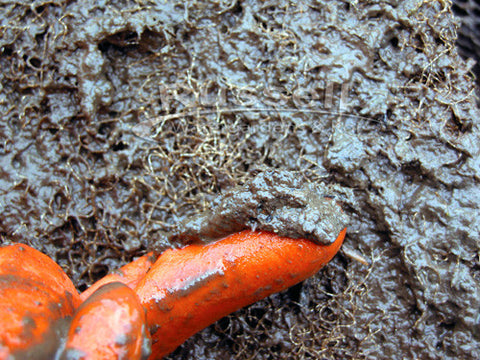
Once the bio media is saturated, the water flow channels around the filter media and is returned to the pond unfiltered. Additionally, the filter pads, lava rock, and other common types of filter media inside conventional waterfall filters are too dense to rinse with low pressure water. The filter pads, lava rock, or other bio media must be removed from the typical waterfall filter for hand cleaning.
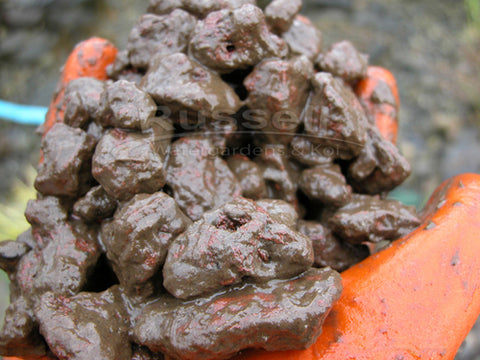
This is why the ecosystem crashes after an annual pond cleaning. High pressure cleaning gets rid of all the good bacteria while you are trying to get rid of the bad. Look at these close-up photos: how efficient do the filter pad and lava rock look to you? Does leaving this inside your filter for an entire year seem right to you? We don't think so!
Another thing about leaving this inside your filter for an entire year: It's obvious that these filter pads and lava rock can't hold onto any more sludge and muck. Where do you think it goes? Yup, you guessed it .... right back into your pond or pondless waterfall basin. Guess what it will then do. You're getting it now! Grow algae and cause fish disease!
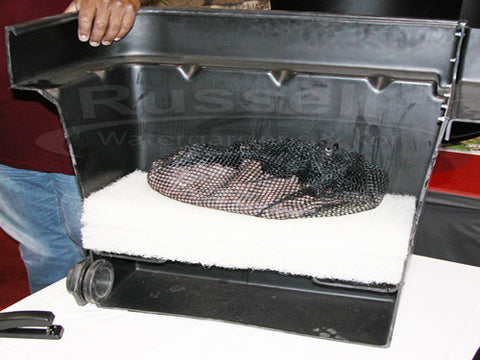
The conventional bio fall type waterfall filter can only be cleaned by hand! When doing your research on which waterfall filter to purchase – you need to ALWAYS ASK:
How Do I Clean
This Waterfall Filter?
There are many manufacturers of these types of conventional waterfall filters: Aquascape, Easy Pro, Atlantic, Pond Builder, Pro Line, Savio, and others. They are commonly referred to as bio falls, puri falls, aqua falls, fast falls, filter falls, cascade falls, elite falls, and many other names.
It doesn’t matter the manufacturer – they may look different on the outside, but inside – where it really matters – they are all the same! Filter pads and media nets are not backwashable, and must be disassembled for cleaning.
This is a copy of an actual manufacturer's owner's manual - they are making our point for us.

As the old sayings go: "You Get What You Pay For " and "Buyer Beware! "
You can do an internet search and find a ton of information about how to clean a conventional bio fall type waterfall filter. They all talk about cleaning the filter pads and the lava rock contained in the media nets …. but what they don’t show is …. what you’re actually cleaning – or how you will be doing it!
This is How to Clean a Conventional Bio Fall Type Waterfall Filter

The first step is to drain the conventional bio fall type waterfall filter
Most likely the filter doesn’t have a drain unless you paid extra for a drain kit - so you’ll have to disconnect the pump and have the dirty filter water empty into the pond skimmer and pond. Careful, it will be under pressure and can get all over you. Or purchase a second pump and hose to pump it out. Again, additional costs to the original purchase price!

The second step is to remove the media nets
These are usually filled with lava rock, but they can also be filled with bio balls or other form of bio media. Lava rock is the most commonly used media in these nets because the lava rock is heavy and holds the filter pads down inside the conventional bio fall type waterfall filter.
These saturated media nets can be very heavy – so be careful lifting them out. Small conventional waterfall filters may have only one such media net, but the average size filter contain two or three. Larger waterfall filters contain six or more media nets.
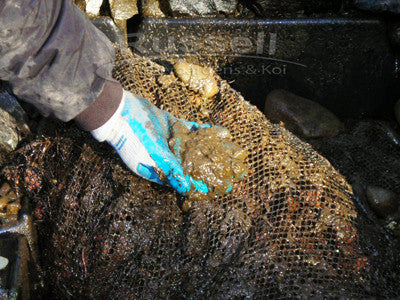
This is what you’ll be cleaning from the media nets. As stated earlier, this is “sludge” consisting of all sorts of smelly decaying things. Make sure to wear protective clothing and gloves when handling saturated bio media. Infections are common problems associated with cleaning a conventional bio fall type waterfall filter. In looking at these photos, you can imagine the disgusting smell of this decaying sludge and muck.

Look at this lava rock. This has been in this conventional bio fall type waterfall filter for an entire year! In the words of Howard Hughes: “Does that look clean to you?”. The pores in the lava are completely filled with sludge. The only way to clean this is with high pressure washing. It is widely understood that using high pressure water to clean bio media destroys the beneficial bacteria living on it. This destroys the pond filter’s ability to perform its primary job of bio reaction.
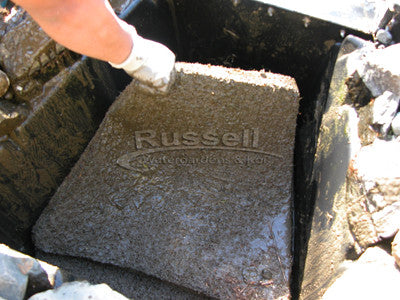
The next step is to remove the filter pads
They too can be heavy. The typical conventional bio fall type waterfall filter contains two to three of these saturated filter pads. Again, it is recommended to use long sleeve rubber gloves and eye protection when handling sludge saturated filter pads.
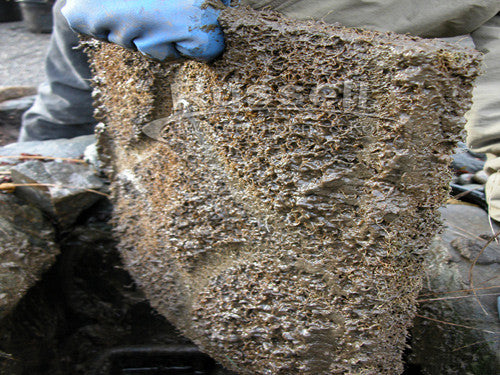
These filter pads have been in this conventional bio fall type waterfall filter for an entire year! How effective do YOU think they can be when they’re clearly saturated with sludge?
Filter pads saturated with sludge promote harmful pathogenic bacteria to proliferate and provide a huge food source for algae!
No "if's, and's, or but's"! We've been in this industry since 1997 and know what we're talking about. How do you think we get all these photos? Our service crews were booked solid from people paying us their hard-earned money to clean their ponds and filters! We photograph the jobs. If only they had all this information BEFORE they bought one of these bio fall type of "annually cleaned" waterfall filters - or hired a contractor to install one!
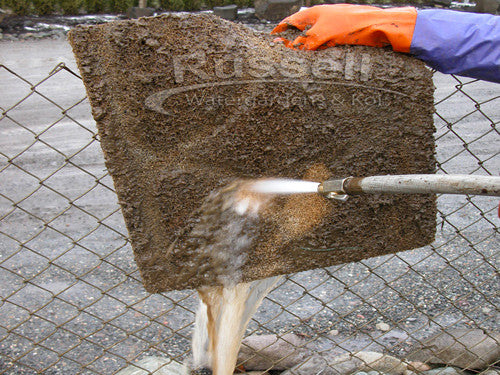
The next step is to high pressure rinse the filter pads and lava rock
This can get very messy! For your safety make sure to wear rubber rain gear, long sleeve rubber gloves, and protective eye-wear. Make sure to keep your mouth closed!
When high pressure rinsing the completely sludge-saturated filter pads - make sure you use enough water pressure to clean the pad, but not so much that you disintegrate it! Filter pads are expensive to replace!

The Next Step is to Clean the Inside of the Waterfall Filter Itself
The conventional bio fall type waterfall filter does not have a drain which makes this process very difficult. Wipe and rinse the sludge and muck from the walls of the filter and pump, or shop-vac out the slurry. If you paid extra for a drain, then rinse the sludge and muck out the drain, then shop-vac the remaining slurry that is below the drain (since the drain isn’t really a drain but a reversed inlet on the side of the filter – and above the bottom).
Any guesses as to what this smells like?

The next step is to catch and relocate all your fish then drain and clean the pond bottom
This is the costliest part of the “annual clean-out” or “spring-cleaning”. You’ll need a net to catch the fish, a tank large enough to hold them all, a net large enough to cover the tank so your fish don’t jump out, and an aeration system for the tank to provide oxygen to your fish.

You also need a dirty water trash pump and enough hose to discharge the dirty water somewhere – make sure to not flood a neighbor’s yard! Also, in most communities it is unlawful to dump this dirty water into the storm drains. Check with your local Authorities first - or you could be subject to a large fine.

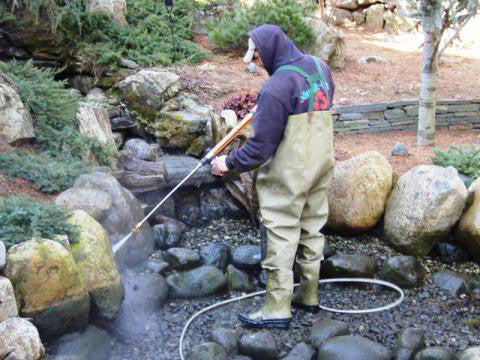
You’ll be pumping out ALL the pond water, pressure washing the entire pond, waterfalls, stream (if you have one), and then re-filling the entire pond with fresh water. Depending on the size of your pond, the water bill can be quite high. Or, you can pay a professional who already owns the required equipment a lot of money to do it for you. You must factor in this large annual cost when you’re contemplating which waterfall filter to purchase.
All the additional costs can run you hundreds and hundreds of dollars. Oh by the way, if you don't own a pressure washer - add the rental cost to the price of the conventional bio fall type waterfall filter. Add all these additional costs to the price of a conventional bio fall type waterfall filter. That cheap price for a waterfall filter isn't looking so cheap now is it? Again, "You get what you pay for!" Are you beginning to understand how and why a Hydro Vortex™ waterfall filter lowers your cost of ownership?
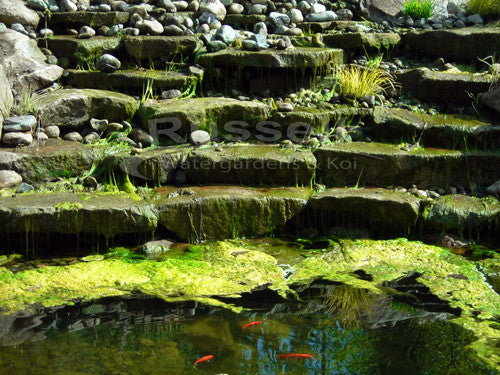
A conventional waterfall filter - be it bio falls, aqua falls, filter falls, or the many other terms used to describe these types of hard to clean waterfall filters ALL state they only require "annual-cleaning". These waterfall filters get clogged with sludge and then pass sludge to the pond where it settles to the bottom. This requires the pond to be completely drained and cleaned every year at a large annual expense. Ponds with these types of filters experience excessive algae growth, become unsightly very quickly, and create non-ideal living conditions for koi, pond fish, and other aquatic life.
If "a picture is worth a thousand words", then how many words do all our photos tell you? You can CLEARLY see that these photos are NOT doctored in any way.
As mentioned earlier, our service division was booked months in advance to clean ponds and pondless waterfalls that were filtered with these types of waterfall filters. This is also why we booked for so many Ectomies!
What are People Doing with their "Annually Cleaned"
Conventional Bio Fall Type Waterfall Filter?
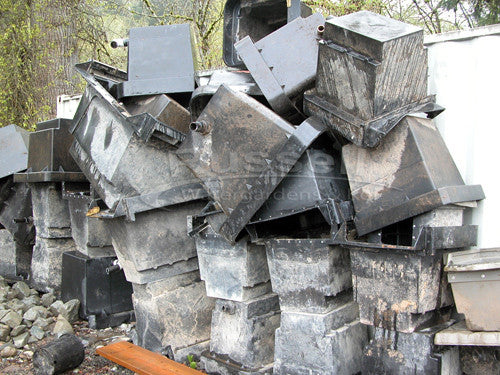
People are ripping them out in record numbers all across the country!
This process is known as a “Filter-Ectomy”. A Filter-Ectomy is the replacement of the conventional non-backwashable bio fall type waterfall filter with a completely backflushable Hydro Vortex™ waterfall filter.
When people get tired of their hard to clean conventional bio fall type waterfall filter – the algae, sick fish, and headaches associated with them – they replace them with Hydro Vortex™. We get lots of plastic to recycle every year!
If you’re considering purchasing a conventional bio fall type typical waterfall filter – no matter the brand – you have to add the cost of annual cleaning and the eventual filter-ectomy to the price of that filter.
If you purchase a waterfall filter solely on price alone, you will end up paying a lot more in the future. The conventional bio fall type waterfall filter has a much higher cost of ownership than Hydro Vortex™ backwashable waterfall filter.
Do Yourself a Favor,
Pay a Little More for a Hydro Vortex™ Waterfall Filter
So You Can SAVE Thousands of Dollars Over Time.
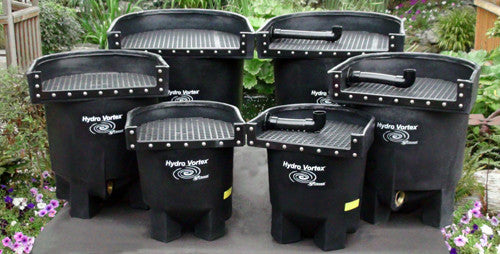
The solution to the conventional "annually cleaned" waterfall filter is the patented backwashable Hydro Vortex™. With the patented Hydro Vortex™ fully backwashable waterfall filter, you can routinely rinse the filter free of mulm and detritus before it can become sludge. Keeping the filter clean on a routine basis will prevent it from passing sludge to the pond so the pond will remain much more clean.
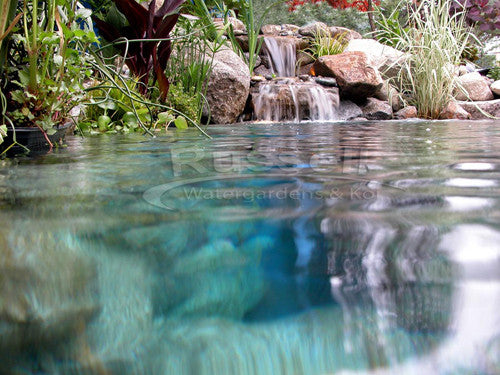
With a Hydro Vortex™ backwashable waterfall filter, you can routinely clean the pond bottom with a garden hose leaving the pond full of water and your fish swimming around in it. Simply use a garden hose to “fluff” any debris that has settled to the pond bottom. The water will temporarily cloud up. Your pump will pass the cloudy water to the Hydro Vortex™ filter where the filter’s vortex and the Hydro FilterSilk™ media will clean the water. Then simply perform a backwash of the Hydro Vortex™ filter. You can have a clean pond all year round without having to catch and remove your fish, drain the pond, or disassemble the filter for cleaning.
A clean pond is a healthy pond for your koi, pond fish, turtles, and the wildlife that visit the pond. In addition, a clean pond has much less algae than a dirty pond. It is just common sense.
The TRUTH About "Annually" Cleaned Waterfall Filters?"
They Get Replaced With .....
Patented Hydro Vortex™ Professional Backwashable Waterfall Filters …
Easy to Clean Waterfall Filters
Beautiful Waterfalls – Clean Water


